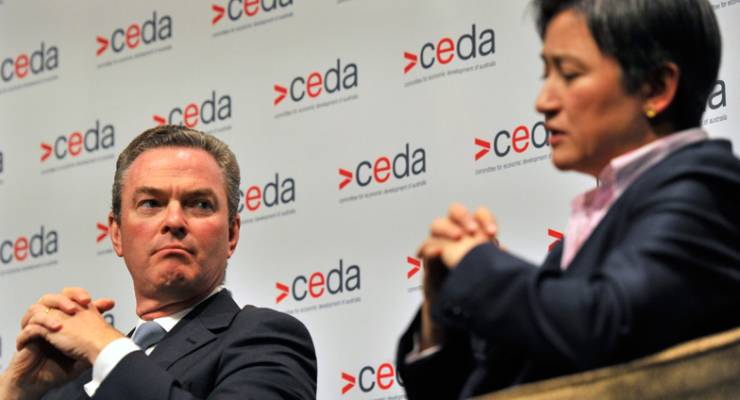
During this federal election campaign, the major parties are courting South Australia. Both have much to lose. South Australia, as the ABC’s Chris Uhlmann has argued, is impossible to call. Many lower house seats are the subject of three-cornered contests. So at a Committee for Economic Development of Australia-organised debate at the Intercontinental in Adelaide yesterday, the Liberal and Labor parties put forward their most senior and most charismatic SA locals to convince an audience of business people and accountants (KPMG was the sponsor) that their side had the best plan to solve Australia’s economic problems.
South Australia has the weakest economic growth figure in the country. A state historically dependent on big projects — mining, defence industries, car manufacturing — to employ thousands, it’s been hard hit in recent years through the closure, downsizing or uncertainty surrounding many key employers. Its economic woes are decades in the making, and the state Labor government is, for better or worse, pinning its hopes on entrepreneurialism and start-ups (and submarines) as a way to jump-start the economy.
One in five South Australians, if you believe the polls, are pinning their hopes on another party altogether. The Nick Xenophon Team is polling at 22% according to Newspoll. That’s less than 10 percentage points behind the figures for both Labor and the Liberals.
Xenophon wasn’t there, but he loomed over the debate. Industry Minister Christopher Pyne and opposition finance spokesperson Penny Wong did their best to bury him. Neither mentioned him at all during their stump speeches, but when prompted during the debate that followed, they were both happy to unleash.
[Xenophon is coming — and disruption follows with him]
Wong disputed Xenophon’s claim he hadn’t filled his party with political hacks. She begged to differ, saying he’d filled his party instead with “ex-political hacks”. Many of his candidates, she said, had previously run with others or been staffers.
Pyne agreed, saying most of the NXT candidates were unknown, but the things people did know about Xenophon’s “group of strangers” should “frighten the hell out of them”.
Wong said Xenophon was talking to people’s fears. “I can understand why they will listen to Nick,” she said. “Nick may or may not be part of the problem, but he’s certainly not the solution.”
When the ABC’s Fran Kelly, who was moderating the debate, made a fleeting reference to Xenophon’s claim that he represented the “sensible centre”, Pyne slapped it down.
“He votes with the Greens two-thirds of the time since 2007 when he was elected to the Senate,” Pyne said.
“But yet he still pretends he’s in the sensible centre … The reason why he has a high vote in this state is because he effectively does and can agree with every interlocutor he’s speaking to, because he never has to break their hearts.
“He never actually has to deal responsibly with any policy issue, because he never has to deliver on it.”
[NXT stop: the balance of power]
In the lower house, NXT is polling best in two seats held by the Liberals: Mayo (held by Jamie Briggs) and Grey (held by Rowan Ramsey). Pyne talked down the individual-seat polling that has led people to assume Xenophon would hold the balance of power in the next Parliament. In the seat of Grey, for instance, Xenophon candidate Andrea Broadfoot is polling at 30%. But the seat of Grey is “almost impossible to poll”, Pyne said. It covers 92% of South Australia, geographically speaking.
“Inside story: every time we’ve polled it for the last 20 years its showed us being canned in that seat. And we’ve grown our margins. To rely on a poll in Grey would be very foolhardy,” Pyne said.
So why should South Australia return a Turnbull government? Pyne said in his two decades in Parliament, he’d never seen a government offer policies so tailored to South Australia. From submarines to small business tax cuts to the government’s innovation agenda, the state stood to benefit more than most from the Liberal plan. And anyway, he said, Australia has suffered from a lack of sustained economic decision-making in recent years. Now wasn’t the time to change course, the implication was. Australia has done that too often of late.
Pyne didn’t speak much of what his government had done for South Australia — more what his government would do. Wong seized on this, quoting John Howard’s maxim that people deciding how to vote should consider whether they were better or worse off than they were last election. She said it was good that the Coalition had promised to build submarines in SA, but it was “an election-eve commitment because [the Coalition] realised it was heading for a disaster in South Australia”.








Quote: “So why should South Australia return a Turnbull government? Pyne said in his two decades in Parliament, he’d never seen a government offer policies so tailored to South Australia.”
Quote: “She said it was good that the Coalition had promised to build submarines in SA, but it was “an election-eve commitment because [the Coalition] realised it was heading for a disaster in South Australia”.
Yep, while Mr Xenephon is apparently “certainly not the solution” and supposedly will never have to deliver on policy, both Pyne and Wong seem to be confirming how much he has already done for his state….